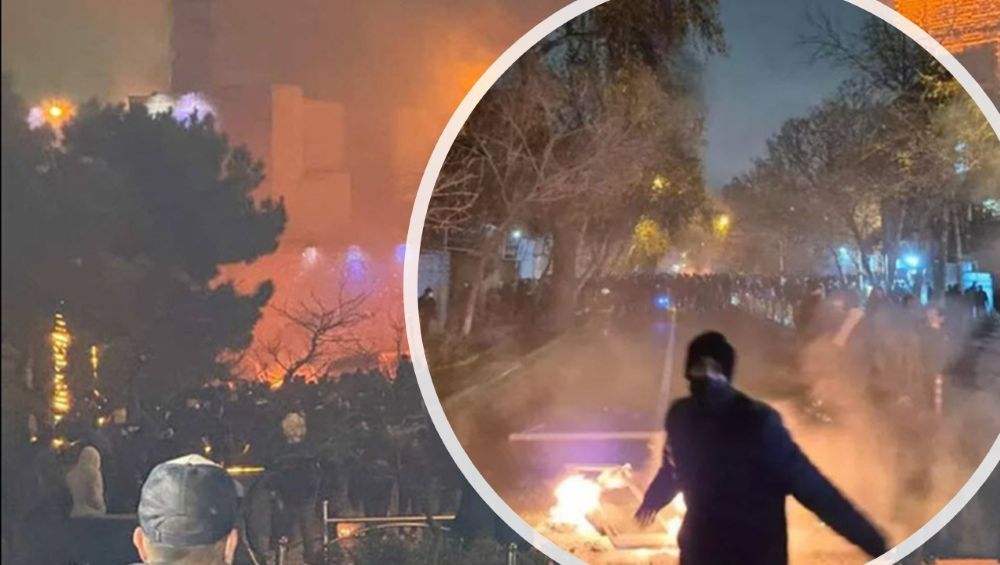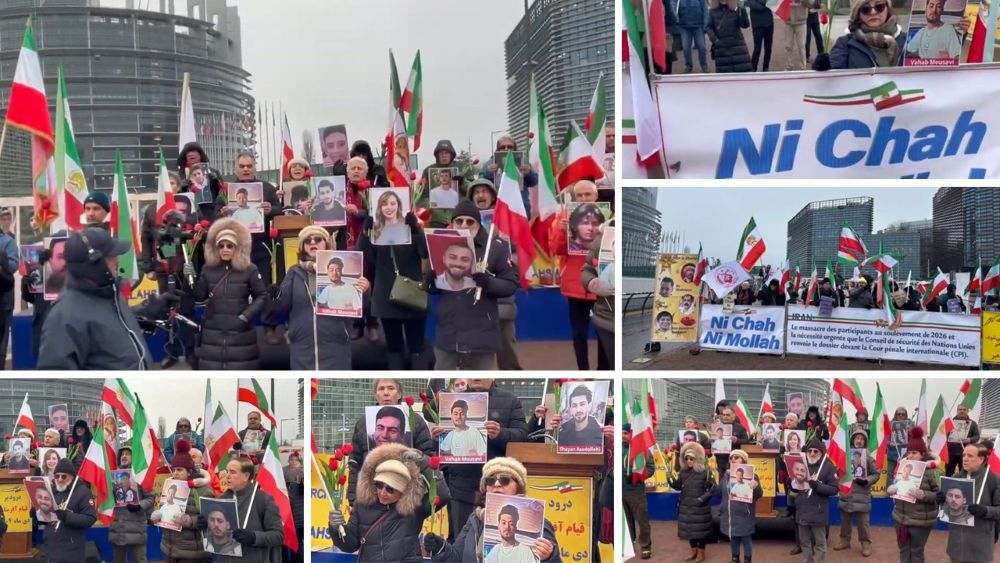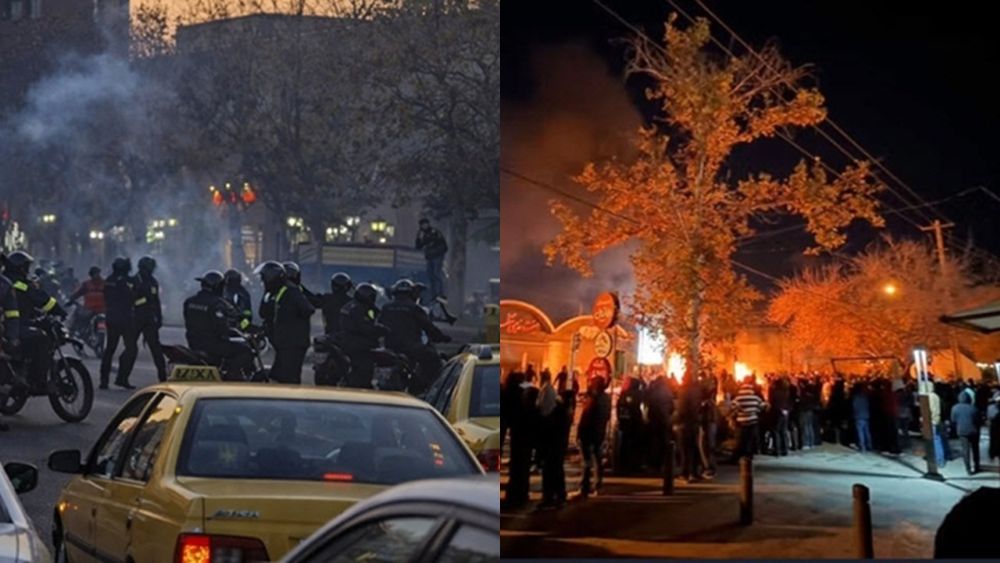Online Conference held under title, “Iran’s Ongoing Crimes Against Humanity, EU’s political and moral obligations”. The online event was on October 7, 2020. Dozens of members of the European Parliament attended and spoke at the conference.
MEPs called on the European Union to fulfill its moral and political obligations in the face of human rights violations in Iran. They also called for a firm policy by the European Union against the mullah regime in Iran.
Mrs. Maryam Rajavi, the President-elect of the National Council of Resistance of Iran(NCRI), was the keynote speaker at this conference. Her message was welcomed as a democratic solution to Iran’s future. Mrs. Rajavi‘s ten-point plan has widespread support from the majority of MEPs for a long time.
#HappeningNow live program to address crimes of the Iranian regime
— Iran Freedom (@4FreedominIran) October 7, 2020
The people of Iran .@iran_policy want #EU to obide its political & moral obligations#NoImpunity4Mullahs https://t.co/oz2J7lP33M
Online Conference: Mrs. Maryam Rajavi, the President-elect of the National Council of Resistance of Iran(NCRI)
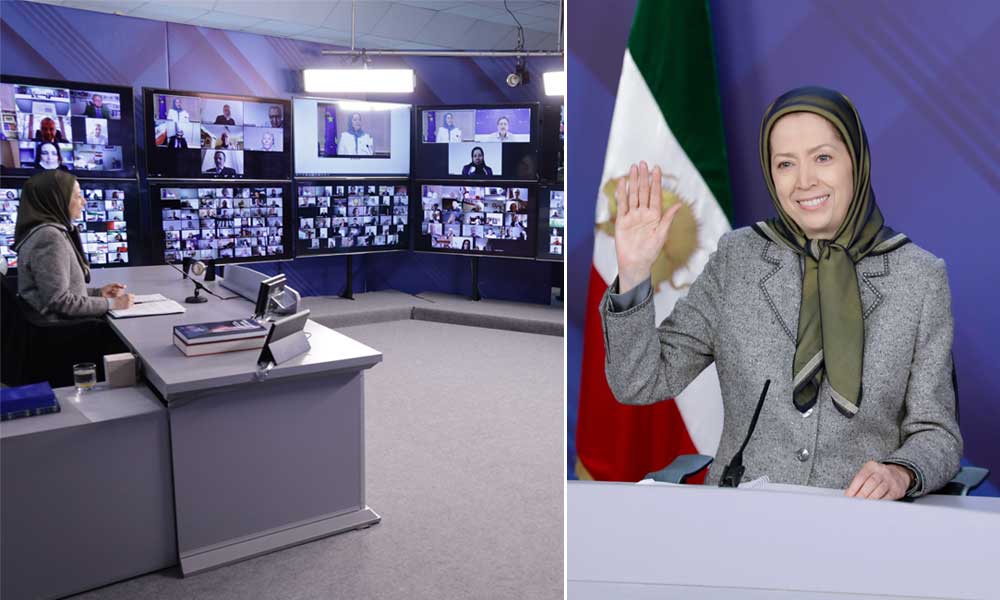
Honorable representatives,
I thank you for having this opportunity to speak to you.
I appreciate your continued attention to the plight of the people of Iran and their desire for freedom against the religious dictatorship.
Dear friends,
Dozens of political prisoners are on the death row in Iran.
Political prisoners are under torture.
Today, you can hear families of thousands of those killed in recent protests, calling on Europe and the world to stand by them.
This regime is facing the anger and discontent of the vast majority of the Iranian people.
In addition to thousands of large and small protests, five major uprisings have erupted in Iran since January 2018.
Truck drivers, teachers, nurses, college students, factory workers and oil workers, time and again, rose up and cried out their protest.
The Resistance Units and courageous youth, through their activities, have had a great impact on shattering the atmosphere of fear and terror. They are paving the way for further protests and uprisings.
Distinguished parliamentarians,
The mullahs’ inhuman policies are surprising for some people. Why do they execute a young national champion, Navid Afkari, despite global and domestic protests?
Why do they target airports, oil installations and oil tankers?
And why don’t they give up their nuclear and missile programs, or their criminal wars in the Middle East?
Implications of the West’s disastrous policy
No more illusions are left, today, about the regime moderating or changing its behavior.
Years ago, the European Troika experienced human rights dialogue, critical dialogue, and constructive engagement with this regime. The outcome of each of these policies was just disastrous.
The JCPOA also led to nothing but reinforcement of the IRGC, further suppression of the people of Iran, more warmongering in Syria, Iraq, and Yemen, and more terrorism in Europe and other countries.
It got to a point where three years after the nuclear deal and lifting of the sanctions, a so-called diplomat of the regime carried a bomb with him in Europe. Then, he personally handed it over to his agents to blow up the annual gathering of the Iranian Resistance in Paris.
Before that, he had personally travelled to Paris in June 2017 to gather information on the relevant places to carry out the horrific plan the following year. To coordinate with the officials in Iran, he travelled there at least six times in the first half of 2018. Today, he is imprisoned in Belgium and his trial is going to be held next month.
What was supposed to take place was a great crime against humanity and one of the greatest terrorist disasters in Europe.
In my testimony to the investigation, I presented the documents, emphasizing that this criminal plan had been prepared in the regime’s Supreme Security Council headed by Hassan Rouhani and carried out on the orders of Ali Khamenei. Therefore, Khamenei, Rouhani, Zarif, and Alavi, the regime’s Intelligence Minister, must face justice.
The big question, however, is this: Why has the regime become so emboldened to engage one of their diplomats directly in a terrorist operation?
One reason is that the regime is desperate in the face of the Iranian people’s protests and the significant role of the Iranian Resistance in the uprisings.
But another reason is that the regime was confident that it would not pay any price for committing such major terrorist crime in the heart of Europe, due to the ongoing policy of appeasement.
Indeed, how could the EU turn a blind eye on the regime’s agents and spies who are on the move on European soil?
European intelligence services have repeatedly reported that the regime’s embassies are centers of espionage and operations against dissidents, especially the PMOI.
What must be done?
Opposition to the extension of the arms embargo against the regime, inaction vis-à-vis human rights abuses in Iran, indifference towards constant movement of the Intelligence Ministry and Qods Force agents in Europe, and giving them free hand to do business are all against the interests of the people of Iran and against global peace and security.
The developments of the past year have shown that the people of Iran are ready to overthrow the clerical regime and establish a pluralist republic based on separation of religion and state and gender equality, abolition of the death penalty respect for the rights of ethnic groups, and a non-nuclear Iran.
In such circumstances, the security of Europe, its long-term economic interests and its relations with the Middle East, depend on its decision to stand by the people of Iran, and not by the mullahs.
Honorable representatives,
On behalf of the Iranian people’s Resistance, I propose a policy with three elements: Human rights for the people of Iran, comprehensive embargo of the religious dictatorship, and recognition of the Iranian people’s Resistance for freedom and democracy.
I urge the Parliament of Europe to urge the Council of Ministers to adopt a binding legislation, to expel the Iranian regime’s agents from the European soil, shut down the regime’s embassies in all EU member states, and designate the IRGC and its proxies in Iraq, Syria, Lebanon, Yemen, and other countries as terrorist groups.
An independent international mission must investigate the massacre of 30,000 political prisoners in Iran and the slaughter of more than 1,500 protesters by Khamenei during the November 2019 uprising.
The mission must also investigate the condition of prisons and prisoners in Iran, particularly the political prisoners. We demand the release of all political prisoners.
I sincerely thank members of the European Parliament and the role this body plays in defending the human rights and resistance of the people of Iran.
Thank you very much
Juan Fernando López Aguilar, MEP from Spain

As a member of the European Parliament and Chair of the Committee of Liberties, Justice and Home Affairs of the European Parliament, I would like to salute all of the participants of this conference, always committed to human rights, which means to me and for the European Parliament, and all, equal rights, and that is an issue.
Of course, when it comes to Iran, just this morning, we had a debate with High Representative Burrell on the situation on Iran. We made a point, yes, we stand by the European Union’s position to uphold the so-called Joint Commission, which secures the understanding that proliferation of weapons will be deterred, will be prevented, when it comes to nuclear, ballistic or conventional weapons as well.
But by the same token, we insist from the European Parliament that the European Union must be significant when making the case of equal human rights, equal rights, before the law in Iran. And that is something that is of the essence, particularly in view of the 2019 uprisings where at least 12,000s were arrested.
There was police brutality and repression, ongoing, always the same issue, repression against dissidents in Iran. Execution of the death penalty is also frequent and systematic as a punishment for dissidents. Discrimination against entire categories of person, to begin with, women is also an outstanding priority for the European Union external action service and for the diplomatic efforts that have to be made to stop that from happening.
Iranian women face discrimination, personal status, matters relate to marriage, divorce, inheritance, child custody. Iranian law allows girls at 13 and boys at 15 to get married despite the efforts to hire, to increase that minimum age that have been prevented by the Iranian leading authorities. Iranian law denies freedom of religion as so many other freedom and fundamental rights.
So, we make a case by saying that, yes, we are making an effort to prevent proliferation of weapons and to stand by the agreement that made it possible, but we also have a duty, moral, political, legal duty to stand up for human rights in Iran and particular respect for dissenters and political opposition. That is why I can only salute this opportunity to spread this message on behalf of the Committee of Liberty, Justice and Home Affairs of the European Parliament. Wish you well.
Rasa Juknevičienė, MEP from Lithuania
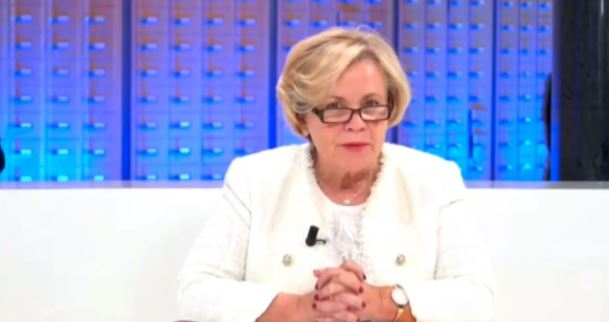
Over the past year, human rights violations by the Iranian regime have been on full display, exposing the mullahs’ brutal suppression. The Amnesty International report in early September on the torture and treatment of the November 2019 protests detainees is shocking. Increasing arbitrary arrests and torturing young people who are Iran’s elite and assets that any country would have been proud to have, in order to get forced confessions is vicious. Navid Afkari, the 27-year-old wrestling champion, who would have been promoted and taken care of by any other country to bring home a gold medal, was savagely tortured and executed by the regime for defying the mullahs and participating in anti-government protests, despite calls from around the globe to save his life. The regime resorts to these types of crimes out of desperation because Iran’s situation is explosive. Daily protests continue unabated in Iran
The message is clear. On the one hand the Iranian people don’t want this regime and are vehemently opposed to it and on the other hand, a powerful alternative exists, meaning that change in Iran is imminent and the regime is terrified by this ultimate fate.
Given these circumstances, what should our policy be in Europe vis-à-vis the Iranian regime? We must stand by the Iranian people as doing so is defending our democratic principles. We must stand firm against the regime, condemn its suppression with the strongest terms and hold it to account. We should not be deceived by the regime’s lies about the lack of an alternative. The time to act is now.
Jan Zahradil, MEP from the Czech Republic, President of the ECR Party (2009 – 2020), Vice Chair, European Parliament International Trade Committee
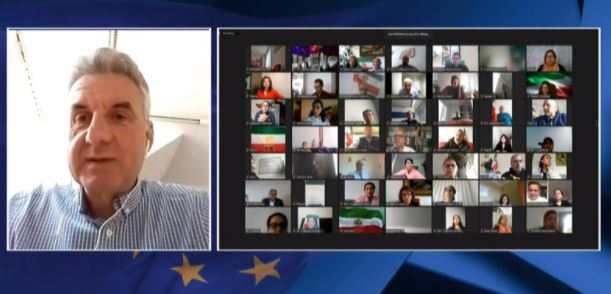
We’re at a crucial point in history. The region is unstable. There are more conflicts. We should pay more attention to what’s going on in Iran. The very core of the Iranian regime is not changing and won’t change without pressure. It’s a fundamentalist regime, a dictatorship, a brutal theocracy. It is contrary to basic human rights concepts.
Unfortunately, the EU approach didn’t change much either. Many EU governments are underestimating the nature of this regime and the danger it presents to Europe and democratic countries across the world.
We must push the EU and Borrell to change this policy. The EU must not just watch. It must act. We can also take measures at national level. We must also take action at the level of European institutions.
I see no reason why we shouldn’t start to cooperate more closely with the opposition. I believe that once they take power in Iran, they will be able to turn Iran to a fully democratic and transparent country that fights for equality and against corruption.
We must give them every possible support.
Gianna Gancia, MEP from Italy
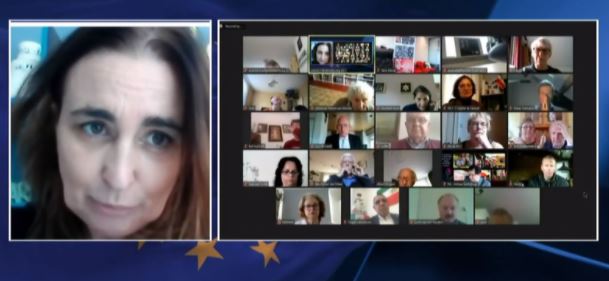
Political prisoners are easily killed under torture. In its latest report, Amnesty International speaks about an “epidemic of torture” in Iranian prisons. Torture is a routine matter in in all detention centers and prisons whether of the security forces or the Intelligence Ministry or in the IRGC. There is no law and no due process.
Everything is arbitrary. As recently revealed by the NCRI, there are secret and unknown torture centers where the torturers can do anything they want with full impunity. This is why it is so vital to put pressure on the regime to open the gates of its dungeons to an international fact-finding mission.
Therefore, I insist that this is an obligation of the EU. With such revealing reports, the situation of the political prisoners is not an internal matter. It is truly an international matter. If today there are European dual citizens taken as hostages in Iran, it is because the EU did not speak with the regime in the right language of firmness. If today the EU does not respond to Mrs. Rajavi’s call, there is no doubt the regime will take more hostages from us and then it will be too late to do anything.
Antonio López-Istúriz White MEP from Spain
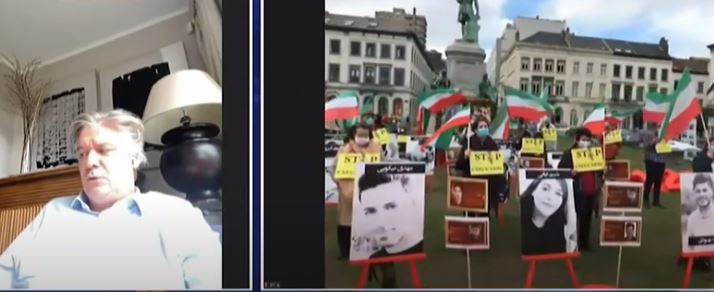
I wanted to mention briefly that we all know that the situation in Iran is deteriorating every day. Thousands of people have been detained for participating in demonstrations over the past two years. This also shows that many, many, many people in Iran are tired and fed up with these regimes. The regime stability can be seen in their foreign actions. The cases are now currently being investigated in Belgium about the interference in Belgium.
Also, the declared anti-agreements, Abraham agreements, declarations from the regime, shows that they don’t want to be part of the evolution of peace and the evolution of good untold between all the actors in the region, the big efforts that I’ve got that taking place as we speak. As well as always the iron wing that is denounced and refused by all the European countries, but also most of them are now acting against the political arm of Hezbollah specifically after we have seen the intervention of Hezbollah, Syria, and under regime of Iran in Lebanon, that has caused so much distress to our good Lebanese friends. There has to be a stop in the external interference in Lebanon.
And finally, for once in history, to leave the Lebanese people to decide their future by themselves. The situation of human rights in Iran, many of the people connected, we all know very well the ruthless crackdown of protesters, and also the executions against the opposition and protesters. I have asked in the European Parliament several locations, our representative, Josep Borrell, about the violation of human rights in the country and what’s going on.
As my colleague in the European Parliament and many others, we are always there to help in order to bring a prosperous, democratic future for Iran that merits, because when I speak about it, I speak about the Iranian people, not of the regime. The Iranian people are so desperate seeking for this democratization of the country for liberties in the past that they had; it merits that. Thank you very much.
Veronika Vrecionová, MEP from Czech Republic
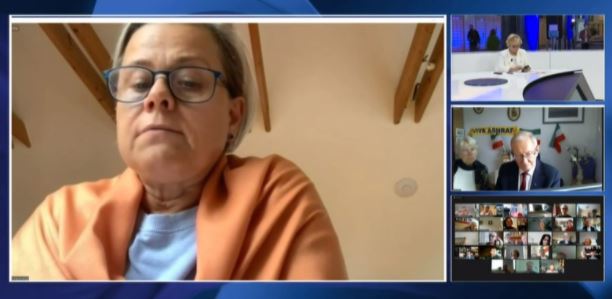
Thank you for inviting me to this conference. I am glad to be here even during these strange times of COVID crisis. We can’t forget people who are facing much more worse situation than the Coronavirus. Thousands of death sentences are executed every year.
Most of these sentences are abused in a non-democratic country like China and Iran. We should remind this medieval, unjust, cruel practice not only on the occasion of the birthday against death penalty, but all the time, and it should be task for us, MEPs.
As we speak about Iran, we were all witnesses of the execution of Iranian famous wrestler, Navid Afkari. He was one of many who were sentenced to this based on false international accusations and torture. Other prisoners, men, women, even children are not famous with international attention, but their lives have no less meaning and their suffering is the same. Iranian vicious practice doesn’t have negative impact only on the national level, but the spread of hatred, terrorism, and violent propaganda is like a sickness that is spreading in the area and beyond.
Personally, as a member of European Parliament, I am therefore ready to show my support as I have done many times before to Iranian people who want freedom, who denounce violence, who want justice in the country, and who want to live in peace.
I would like to thank friends of free Iran and to the President, Mrs. Rajavi, for organizing this conference not only to commemorate people who lost their lives too soon, but also to speak up about the terrible practice of Iranian Government to show support to victims of this horrible regime and to call for the release of prisoners who are held captive without a fair trial.
Thank you again for organizing this conference and I hope to see you next time personally. Have a nice day.
Marco Zanni, MEP from Italy and Chair of the ID Group
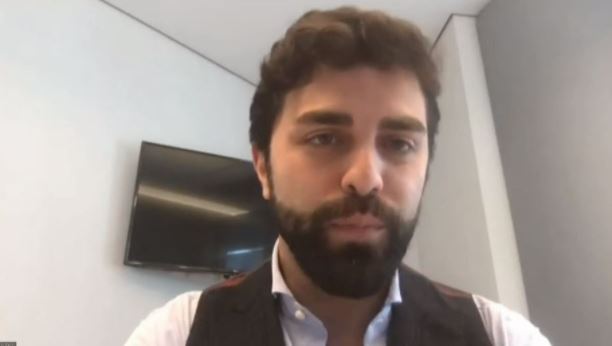
Thank you very much for the opportunity to address this conference supporting Iranian people.
My colleagues pointed out what is the main point, what we can do to support Iranian people. We all know that in the last decades, the Iranian regime has been the protagonist of violations of human rights of its citizens and this is really horrible.
In recent months, we have observed that new demonstrations against the regime in the name of democracy, demonstration are actually repressed by the Iranian authorities with many protesters imprisoned and sentenced to death.
There is a particular case that I’d like to point out, the recent execution of Navid Afkari, a champion wrestler who confessed their alleged crimes under torture. This is just the latest example of the cruelty of the Iranian regime. This is a deplorable and violent episode by the hands of the Iranian regime.
In Europe, an international protest for a fair trial, showing the total disregard for the most fundamental human rights standards, especially this case involved with sport. Sport has traditionally been an instrument of unity, of friendship, of brotherhood, and the regime claimed that the secret execution of Navid Afkari in order to use it as a warning to the population in a climate of increasing social unrest, but in reality, it was a clear admission of weakness.
That was pretty clear. The regime prefers to be defeated by the will of the people and knows it was completely unprepared for the COVID-19 pandemic and the following economic crisis. That’s something that we have to keep in mind, supporting Iranian people in their asking for freedom will show up again. They’re witnesses of the Iranian regime, and we’ll have a democratic transition that Iranian people are asking since many years ago.
Thank you very much again for your lendable initiative and I hope to celebrate with you and all the Iranian people very soon, the freedom of the country for a regime that is destroying the people and also destroying one of the most beautiful country in the world. Thank you very much again.
Milan Zver, MEP from Slovenia

We welcome Mrs. Maryam Rajavi, the President-elect of National Council of Resistance of Iran.
Our gathering the following statement from High Representative Josep Borrell on situation in Iran in the panelists’ session today, since last November, the most significant protests since 2009 against the Iranian regime began and rapidly spread to at least 100 cities throughout the country. Protesters have expressed marvelous economic complaints, but also calling for the structural reform of the political system and condemning current and former Iranian leaders.
I’ve been closely following the developments in Iran. Reports indicated Iranian security forces to refuse harmful force in arresting more than 7,000 people and killed hundreds of people in connection with the protests. Terrorist operations of Iranian security forces on European soil are also of great sum and needed to be stopped. I strongly condemned any acts of violence committed by Iranian regime against the Iranian people and I’m deeply concerned by reports of several fatalities.
Let me make this clear. The Islamic Republic must cease violence against its own people and stop any further terrorist plots abroad. I’m pleased to observe that the free random gathering brought in protesters in Iran have also started to show support for the Iranian opposition leader, Mrs. Maryam Rajavi and her 10 points plan for the future of Iran that caused the democracy, modern legal system, respect of human rights, and market economy.
Mrs. Rajavi, I, too, fully support your unfailing commitments to transform Iran into democratic and free society. As I have stated many times before, I believe you should need stricter policy to impose sanctions and demand from Iranian regime to respect human rights and stop execution of political policemen.
Democratic societies taught remain silent in the face of such human rights violations happening in Iran for the past four decades. It’s our legitimate duty to respond to the people of Iran who are continuing to call legitimated and peaceful protest against the oppressive and corrupt regime. Thank you for your attention.
Ivan Štefanec, MEP from Slovakia
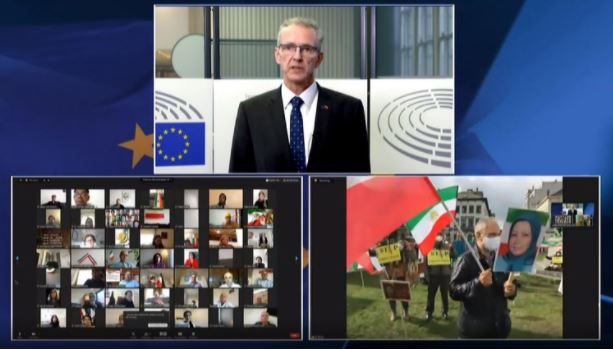
Dear friends. Dear Madame Rajavi. Topic of today’s conference is very crucial. Indeed, an ongoing crime against humanity is happening in Iran. There has been no considerable improvement in human rights situation, if any, but it has worsened. Executions have never stopped. The lack of freedom of speech and assembly, separation of women and religious minorities continue persistently. The recent shocking report of the Amnesty International on torture sounds the alarm.
Iran is on the eve of a great explosion, and we have seen how this regime has brutally suppressed the protesters killing them on the spot or taking them to its dungeons to be killed under torture or be executed. This is the continuation of the 1988 massacre of 30,000 political prisoners, which remains unpunished.
Now, we would like to know where the EU and higher representative stands on the question of human rights in Iran. We do agree that the ongoing crime against humanity has persisted in Iran. For too long, it must be taken and addressed seriously. Human rights should not be seen as a secondary issue which can be overlooked when trying to save the JCPOA or other agreements with this tyrannical regime. Human rights should come first.
Our economy in the European Union and democratic principles demand that the EU takes the lead in defending the Iranian people’s human rights in protesting against the regime for its atrocities. We cannot use soft language to call for restrained when the repressive regime was killing the impoverished protesters in their hundreds during the November 2019 protest in Iran. There is no way that the appealing situation of human rights will change if there is no independent instigation and accountability. This is the kind of policy and action we expect to see from the EU.
In the end, I want to declare my support for the NCRI led by Madame Rajavi and her 10-point plan. I joined my colleague at the European Parliament in our support for the alternative that has tried hard to bring democracy because freedom will shine over Iran very soon. Thank you.
Derk Jan Eppink, MEP from the Netherlands
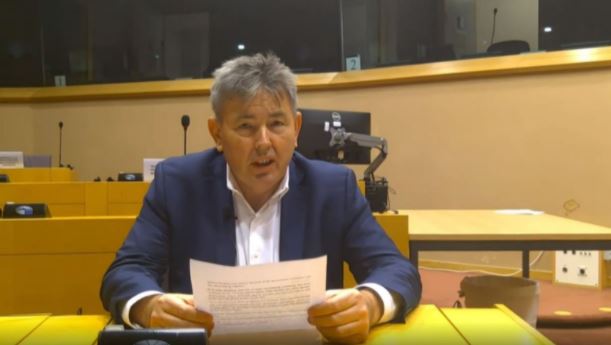
We are highlighting the World Day against the death penalty this week. The Islamic Republic of Iran has some of the most appalling human rights records and has had the highest per capita execution rate in the world for many years.
I was shocked to hear about the recent execution of the 27-year-old national hero and wrestler champion, Navid Afkari, for his participation in anti-government protest. This is totally unacceptable. Unfortunately, we see the EU’s appeasement policy where their prioritizing economic interest over human rights has been aiding the Mullahs at a heavy price for the Iranian population.
The result is that today we are facing an ever more aggressive and abusive regime, which is not only victimizing its own citizens, but it’s also exporting terrorism to the rest of the world. So far, the EU has been opposing the reimposition of the UN Security Council sanctions on Iran.
They are somehow willingly falling into the Iranian propaganda trap, that these sanctions will help the people only. The truth is that these UN sanctions are targeting Iran’s military and arm sales, the regime’s nuclear program, and the notorious Islamic Revolutionary Guard.
None of these have anything to do with the people’s interest in Iran. In fact, when the sanctions were lifted following the nuclear agreement of 2016, the money that poured into Iran ended up only in the pockets of the Revolutionary Guard and its repressive machine. It held the Mullahs to strengthen the iron grip on the population and the ordinary citizens became even poorer because of the government corruption and the skyrocketing inflation.
It is very shocking that the EU is even considering removing the arms embargo on the Tehran regime, which is the number one state sponsor on terrorism. This is definitely against our own security in Europe, as well as the security of the people in Iran.
We in the EU must stand up against the inhuman theocracy, and instead side with the Iranian people and their democratic aspirations, which are represented in the Iranian resistance under the leadership of Mrs. Maryam Rajavi.
I know her very well and have met her here in the European Parliament many times. Let us hope our continued effort will soon bring democracy and freedom in Iran. You can, of course, count on me as always. Thank you very much and see you next time.
Benoît Biteau, MEP from France
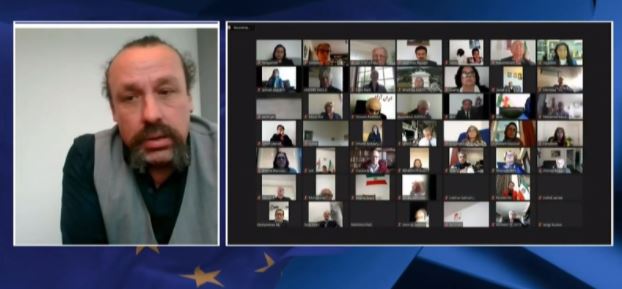
…maximum number of executions and the first one in relation to number one that happened. In 2018, we’re talking about hundreds of real massacres, and we can’t close our eyes to this kind of events. On the 12th of September 2020, a month ago, Navid Afkari was executed he was executed secretly without his lawyers being warned, without family being warned, without him being warned of his execution.
So, how can we actually carry on closing our eyes on this kind of inhumanity, it’s no longer possible. And therefore, this repression against the demonstrations of democracy of 2019, which in fact was also wildly repressed to be heard, and to the 10s of protesters were arrested and imprisoned, they should be freed and no longer so this kind of situation arrives and hundreds of families who have no news of their nearest and dearest should have news about them, even if the worst has happened.
Iran is the only country in the world that also executes children, and their situation is even more dramatic. And we can’t carry on like this. In fact, my compatriots, was arrested June 2019. She was initially condemned to death. That’s why we really have to mobilize after an international protester.
She won’t be executed, however he has been condemned to five years prison. On 3rd of October 2012, she came out of prison, but with an electronic attack. So, you can see to what extent in fact, justice can be contested in this country. So, we want her to be freed immediately, without delay.
And since I’ve been in the European Parliament, I know that on two occasions, we voted upon resolutions that firmly condemned these violations of human rights in Iran. And what I can also reassure you of this afternoon in relation to that event, and I saw your colleagues in front of the Parliament, up until the end of my mandate, you can count on me to denounce executions in Iran and in all other countries throughout the world.
For me, that’s simply a continuation of a kind of barbarism, as we still find in China or in the States. So, we’ve got to get out of that situation. We have to, in fact, trust humanity rather than practices of another time. That absolutely must disappear from all zones of the planet. Thank you very much for your attention, and very good luck on this noble fight, which we must win as quickly as possible.
Patrizia Toia, MEP from Italy
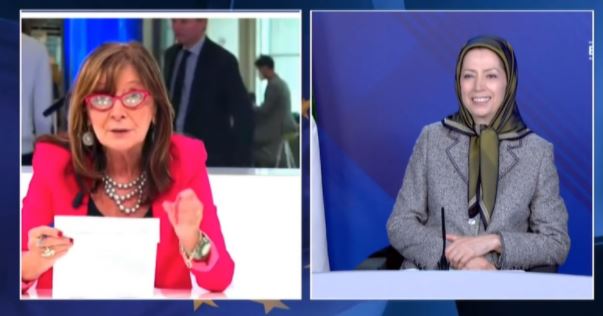
I’m very happy to be here, at this online conference. We have a long list of colleagues that will participate with their speeches. That means that nothing can stop our efforts to defend democracy and human rights in Iran, not even COVID-19.
Because in Iran, misogyny dominates the constitutional law and the legal system. Repression of women in Iran has always been the concern of European parliamentarians. Women are systematically repressed and badly treated by the regime. They’ve been deprived more than any other Iranian citizens. They have no human rights and they have suffered so much apartheid, which has been practiced by the Mullahs’ regime, that means that the suicide rate in Iran is the highest amongst women. That really is a matter that we must really think about. As far as their political activity, they’ve undergone the greatest level of torture and bad treatment. Even pregnant women have been executed by this regime, and that is appalling. They are women who have suffered the most. It’s women who’ve suffered the most by the regime during COVID-19.
According to information that was obtained by the international organizations, nine prisoners were contaminated at the Tabriz prison, and within other prisons, there was contamination. But I’m very happy to be able to say that none of this suffering has reduced these women. They carry on fighting. We can see the demonstrations and the uprisings against the regime in Iran. They encourage others to not be silent and to really express their discontent. Female voices dominated all the demonstrations. Women are everywhere when you need courage and to shout against dictatorship. Why? Because they do have models that they can be inspired by. In fact, there is a resistance movement with which we’re communicating today.
It’s led by Maryam Rajavi, and I have an enormous respect for her. I know her and I really have an enormous amount of empathy for her. Mrs. Maryam Rajavi, I call her Maryam. She has put into practice all her ideas as far as equality of gender. She’s a woman of courage and of extraordinary perseverance. She inspires all Iranian women and Iranians. They’re inspired, they want to have freedom, human rights, democracy, social justice, and equality of gender. She’s an inspiration for us, women, who are living in countries where the rights are respected. At the same time, she really is an inspiration for us because of her courage. She’s been fighting for years, and she’s been fighting to try to get the freedom of the people. We want to support her efforts as far as democracy and human rights in Iran. There was an international inquiry. We should visit the prisoners.
As parliamentarians, we have to make sure that European values, such as democracy and human rights, are number one as far as third-party countries are concerned. I believe that apart from any political point of view that exists with regard to Iran today, as far as different political stances, we have to really give priority to human rights and to democracy rather than economic interests or single party interest in order to be able to have the right policy on Iran, to speak with one voice. We are ready to do so. Thank you very much.
Alessandra Moretti, MEP from Italy
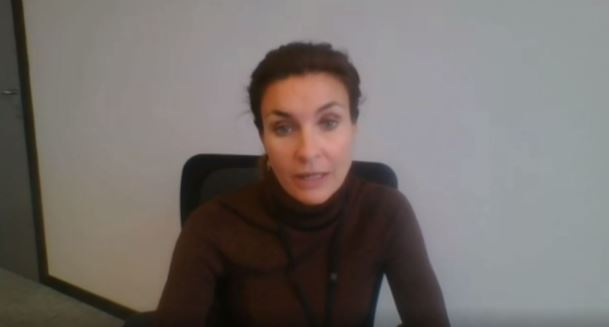
To discuss with you such a crucial and important issue, in the Stockholm declaration drafted by Amnesty International in 1977, we read, “When the state uses its power to end the life of a human being, it is likely that no other right is emulated. The state cannot give live, it should not presume to take it away.” More than 40 years have passed, and in Iran, the violation of basic human rights and crimes against humanity have not stopped, the same violations and crimes that have been condemned by the United Nations 66 times.
The situation in Iran is catastrophic. Iran is the first country for executions in the world. In 2019, there have been 251 death sentences that we know of, accounted for 38% of all executions in the world. Among these, we cannot forget the great number of minors and women who were sent to death. We cannot forget that last year, 13 of these capital sentences were executed in public. We cannot forget the reasons that lead to the conviction of many innocent people.
We cannot forget the iniquity of the trials and the illegality of the detentions. We cannot forget that many prisoners were not allowed to meet with the families and with the lawyers before being killed. We cannot forget that men, women, and children have been tortured and persecuted.
We cannot forget what happened to the 30,000 political prisoners who were massacred in 1988 and the fact that the perpetrators have not been punished yet. We cannot forget the death of the 1,500 Pacific protesters that this past November we’re fighting for their freedom.
We cannot forget the recent and terrible execution of the Iranian wrestling champion, Navid Afkari as we cannot forget the sacrifices made by many young women who lost their lives trying to obtain what we consider basic rights. I want to remind you the recent passing of Sahar Khodayari who set herself on fire in front of the court that wanted to punish her for entering a football stadium of the death of the who was sentenced to 33 years of reclusion and 158 lashes as she was fighting against the death penalty. We should not forget convicted to for the same reason and forced in a cell even when presenting severe common symptoms. We cannot and we must not forget.
Need I remind you of the conditions in which women have to live. They are not allowed to do things that we, in Europe, take for granted. Girls cannot sing or dance, cannot ride a bicycle, cannot choose how to dress and whether were they young or not.
They cannot travel along, and they cannot go to the stadium if not only recently to see the matches of the national team. They cannot choose who to marry and when. In the Penal Code, violence against women for gender motives, domestic abuse, and coercive and early weddings are not recognized as crimes. During 108 women have been executed and many have been sentenced to the long reclusion in prison in which there is no respect of the individual and systematic trinity is perpetrated on a daily basis.
Our fight for the death penalty abolition is not only concerned with the savings of life, based on the strong belief that the right to the life and the respect for human dignity should be universal, but it has to do also with the terrible conditions in which prisoners have to live. Women are forced to stay in overcrowded prisons being subject to ill treatments and with a scarce access to health care and medical treatments, a condition that has been even worsen now due to the recent COVID outbreak.
On this matter, I want to highlight the firm position we took in July when some members of the European Parliament and I presented a letter to the Vice President of the European Commission, Joseph Borrell, asking for an immediate change in the child’s conditions and for the release of the prisoner especially they are rightfully committed human rights defenders. Nonetheless, we will keep following with this close attention how the situation develops and we want the rest until the prisoners are respected.
As I’ve already said, we cannot forget and we won’t. Europe cannot accept such cruelties and violations of the rights we long fought for and on which our society is founded. The impurity of the perpetrators of such offenses is not tolerable and thus, I respectfully call on the High Representative to change it. EU can do more in the fight for human rights of the Iranian people. It should initiate an independent fact finding mission into these crimes. I declare my full support for the viable democratic identity for fundamental change. And I support Madame Rajavi’s 10-point plan for a free and democratic Iran. Thank you very much.
Michèle Alliot-Marie, former MEP and French Minister of Defense and Foreign Affairs
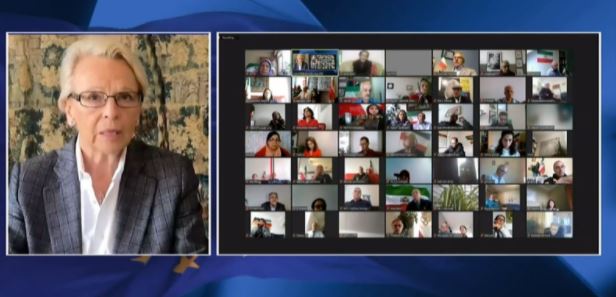
Maryam Rajavi asked me to speak once again in front of you concerning the situation in Iran. I am doing so willingly because I’ve known Maryam Rajavi for years and I really appreciate her determination, her constancy, her sincerity with regard to defending values, which are also my values, values of freedom, freedom to come and go, freedom of speech, freedom of thought, freedom to vote, and also defense of democracy, which means that relations between men and women in a country can be on a free and equal basis, and also her defense of the rights of women.
Today, the whole world is becoming aware of a number of constraints imposed on women, everyone is trying to ensure that every single one can live more freely to make bad choices, and to feel well. That’s something that’s important in life.
Maryam Rajavi, in fact, also says that part of our program is the defense of human rights, which really is at the core, at the heart of the concerns that we all have. It’s the defense also of non-religion. I think that it’s important to defend this way of life, which means that religion is private, in other words, secularism.
Mrs. Rajavi asked me to talk about Iran. I appreciate that she asked me to talk about it. Its history and its culture have also always ensured it had an important role in the region. I am convinced that in coming years, Iran on condition that a number of principles will be applied. Iran will be able to find this rule of stabilization and establishment of peace in a region that’s a very unstable and in a world that is going through a number of constraints.
We can see this once again with a COVID practice. I deplore what is going on in Iran today. It’s in contradiction with the values that I had, to the values that also those of the European Union. From that point of view, I regret very sincerely that the European body is the defender of freedom, democracy and secularism. The heart of their actions are to silence, to take into consideration certain acts, which contradicts the values and acts that are unacceptable.
I’m well aware of this principle of non-response. It’s one of the basis of international relations. And of course, it’s for the Iranians to decide precisely what kind of regime should rule every wrong and what should be their governments, but at the same time, it’s also our responsibility to denounce a number of unacceptable things, the executions, when we’re against pain of death, tortures, arbitrary imprisonment, and also terrorist actions, including on the European territory.
I had the opportunity to say so during my last speech that diplomat will be arrested by the police in Belgium for having prepared terrorist action. It’s really a premier. It’s an extraordinary, number one event. The international policy and from a moral point of view, it’s something we can’t accept. Therefore, having been European parliamentarian, I know that there are a number of debates, but what strikes me always is that as far as unacceptable actions are committed in Iran, they’re far less to condemnation and the actions are far less strong than those relating to acts that are committed in other countries.
So, today, I say so in front of European parliamentarians, I believe that it’s indispensable for this kind of behavior to be condemned by the various European bodies. And also, it’s indispensable for us to come to some concrete response.
Stanislav Polčák, MEP from the Czech Republic
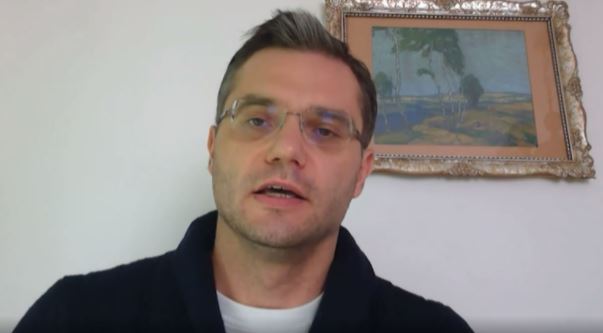
Madam President, dear colleagues, it’s an honor to speak in this conference to discuss situation in Iran and union policy on Iran. We usually deal with human rights violations and terrorist activities of the Iranian regime as two separate issues whereas the two are two sides of the same coin.
The view and approach that allows the regime to suppress peaceful protests of the people, killing more than 1,500 of them, and arresting and torturing thousands of them in November 2019, is the same view and approach that allows it to plot the bombing of the gathering of 100,000 people in Villepinte, near Paris, to kill many innocent people. The regime is doing all this for one reason only: for its own survival.
Many of the regimes’ so-called diplomats have been involved in terrorist plots and were always able to get away with their crimes. But now, for the first time in the field of terrorism, its diplomat has been arrested. Action diplomat would never plan this plot without approval of the top leadership of the regime.
While the judicial proceedings are underway, independent of any political influence, it is time for the high representative of the EU and the governments in Europe to end business as usual with this regime. The regime in Iran must be accountable for such crimes in Europe. Anything less would be a gift to state terrorism.
The European Union must respect its own values, democratic principles. They have been criticizing the EU policy on Iran in the European Parliament for more than one decade. Today, appeasement that this brutal regime is against the security of Europe. The EU must stand with the Iranian people and their democratic alternative, the National Council of Resistance of Iran.
In my years in the European Parliament, I have always maintained close relations with Iranian resistance. Even before that, when I was a member of the trigger parliament, I came to Paris events and met Madame Rajavi on many occasions. So, you can count on my continued support until we have freedom and democracy in Iran. All the best.
Hermann Tertsch, MEP from Spain and Vice-Chair of the ECR group
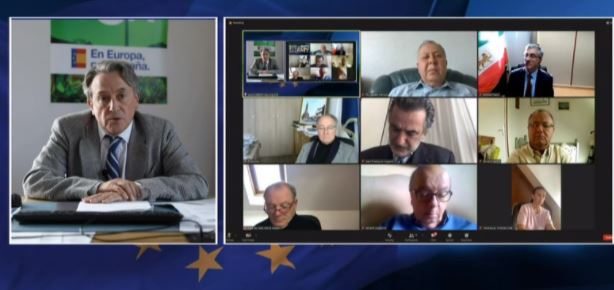
I think it’s very important that in this year we have another gathering in force, searching in ways in the fight for creating the spaces of liberty in Iran that we strongly need to get rid of the criminal regime, which is again showing the worst face and the incapability of every way of having a humane treatment of the population of the Iranian population, 40 years now of tyrannical regime of the mullahs.
And there’s no improvement in the lives of the Iranians. And there are no claims of freedom. We had just in November last year for the expression of the repression of the regime. Over 1,500 young Iranians died in the streets of the cities in Iran, asking for freedom, asking for having dignity, and for having the rights that all citizens of the world should have, which are defended from here, from Europe.
That’s what Europe has to be and that’s one of our commitments. Our commitment of having a Europe far more belligerent in defending the rights of the Iranian people and in fighting against the regime of the mullahs.
We don’t want any appeasement which is so dear to some here in this Parliament. We want no appeasement with this dictatorship, with this tyrannical regime in Tehran. We want a very resolute search for an end of this regime and for a peaceful and democratic Iran in the future. That’s the right of Iranians and that is a right which we have the pride and that we are obliged to fight for it here in Europe and all over the democratic West.
Javier Zarzalejos, MEP from Spain and Secretary-General of the Spanish Prime Minister’s Office (1996-2004)
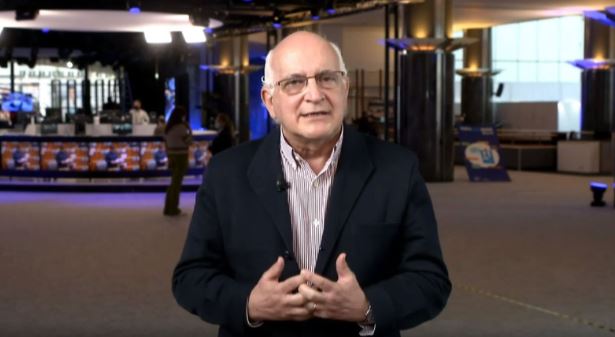
Dear Mrs. Rajavi, distinguished guests, and friends from around the world, I salute you from the European Parliament.
On the occasion of the 18th World Day Against the Death Penalty, I would like to express my deep commitment against death penalty worldwide. I would like to convey to you once again my support, so that the Iranian regime puts an end to the persistent violations of human rights and most significantly to the death penalty that the regime uses as a way of systematically wiping out the political opposition.
Let me tell you that even speaking of the death penalty in this context seems inappropriate to me because it’s not a penalty. It is here in state murder. So far this year, the Rouhani regime has executed 198 people. A few days ago, the international community was shocked by the execution of the 27-year-old Iranian Navid Afkari.
My thoughts are with the political prisoners who are currently subject to torture, forced confessions and sentenced to death. In this regard, I would like to mention especially Atena Daemi, … and several female political prisoners whose lives are in danger.
Again, I take this opportunity to commend the work of the democratic opposition and guarantee you that the European Union does indeed listen to the plight of the Iranian people.
Lars Patrick Berg, MEP from Germany
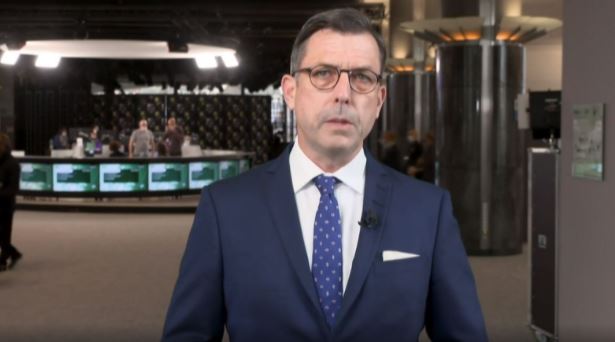
Dear colleagues, dear friends, I am honored to say a few words today particularly, since Iran has the highest executions per capita.
I was appalled to hear that the Mullahs’ regime executed the young Iranian National Sports hero, Navid Afkari, despite so many protests and pleads by political leaders and sports figures from all around the world.
Many German athlete, sports champions, and lawmakers joined the call to stop executions in Iran. Now, several other pro-democracy protesters have been sentenced to death and could be executed anytime from now. I urge that this trend of executions stop. Wanting freedom is not a crime. This total disregard for human life is outrageous.
Until now, as the Iranian opposition has stated, 108 women have been executed by the regime since Hassan Rouhani has been in power. The use of the death sentence for political purposes must be stopped, and such medieval practices must cease.
This behavior has no place in the 21st century. It is time for action by the world’s democratic governments. Words of condemnation are not enough. We need concrete actions.
We, in Europe, must show to the Iranian people that we support their fight for freedom and democracy, and continue to urge the international community to bring pressure on the unrepresentative regime of the Mullahs. Thank you.
Franc Bogovič, MEP from Slovenia
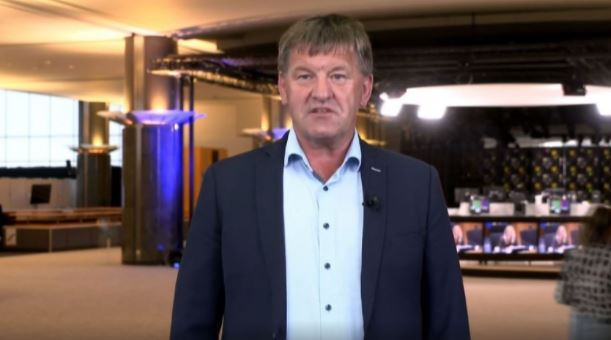
Dear Ms. Rajavi, dear colleagues, my name is Franc Bogovic, member of the European Parliament from Slovenia.
It’s an honor to join our distinguished colleagues, to address the serious concern with regard to Iran. I agree with what my other colleagues said today and support their call for a firm policy on Iran, especially the need to recognize and support the Iranian people and their popular resistance movement, the NCRI, in their quest for a free and democratic Iran, including Ms. Rajavi’s 10-point plan for the free Iran, which symbolize all that is needed for a democratic country.
Even as we are from different parties, we are united in the fact that you must adopt a foreign policy on Iran that holds the regime to account for its terrorism and human rights abuses.
For me, one of the immediate serious concern is the expiring arms embargo in Iran, which will allow the regime to legally buy weapons from China and Russia, and allow Tehran to export weapons to its terrorist proxies across the Middle East.
Allowing the world’s foremost state sponsor of terrorism and world’s leading state executer per capita, legal access to conventional and sophisticated weapons will not only be a threat to the people of Iran and the stability in the region, but also a serious threat to the security of Europe.
That is why I joined over 250 parliamentors from European and Arab countries, in supporting statement on Iran earlier September, that urged the European and Arab governments to work together, extend the arms embargo in Iran, and support the snapback of all UN sanction under UN Security Council Resolution 2231. The EU is seriously concerned about Iran Mulligan role in the region and the domestic crackdown of protesters, but words will not stop or counter the regime in Iran, action will. The EU must now take concrete action based on these concerns.
The best way for the EU leaders in the European governments to do that is by denying the regime the resources, funds, its needs through reimposing UN sanction, and extend arms embargo. This must be the focus on the EU in the coming weeks. Tehran regime will only be persuaded by firm actions and not by hollow condemnation.
David Lega, MEP from Sweden

Friends, for me, as the rapporteur of the EPP group on Iran, it is a pleasure to speak in this conference on the human rights situation in Iran. It is the very injustices, the human rights abuses that the Iranian regime commits against its own people that brings us all together today. I will spend a few minutes talking about that, about the actions of the leaders in Iran.
If the regime seeks to recover respect from their people and from the world, if they seek stability and prosperity for a once great nation, they must respect the commitments that they have made. They must respect human rights. Article 14 of the Iranian constitution says that the government of the Islamic Republic of Iran and all Muslims are duty bound to treat non-Muslims in conformity with ethical norms and to respect the human rights. Their human rights must be respected.
While article 27 of the Constitution allows for public gatherings and marches, the regime just won’t let their citizens speak up. The reigning regime is desperate to control speech, to control ideas, and indeed, to control life itself. The protests in Iran signal that the Iranian people have had enough. They have had enough with their regime’s economic failures, they have had enough with the kleptocrats, and they have had enough with a regime that denies them basic fundamental human dignity that comes from each of us as a nature of our humanity.
Despite the critical situation of the pandemic, Iran has continued to carry out executions of prisoners and still refuses to release prisoners, particularly prisoners of conscience, have sanitary conditions, have proven to be alarming, and threatening. The regime has launched a large-scale arrest of its opponents and a suppressed democratic opposition, which reports daily on the situation of Corona in the country.
I am gravely concerned over the ill-treatment and torture of those who have been arrested. Over the past few years, a large number of prisoners arrested in protests have been murdered while in custody. In almost all cases, Iranian authorities claimed that the prisoners had committed suicide. That is the utmost opposite of human dignity. The death penalty is unacceptable under all circumstances in cases with no exception. It is an inhumane punishment and represents denial of human dignity and integrity.
The European Union has condemned the recent executions in the strongest terms, but more action is required. Inaction is counterproductive and will be missed constructed by Iran as a green light from your European Union visa versus Tehran’s egregious human rights abuses. EU relations with Iran cannot tolerate anything less than a halt to executions and clear progress on human rights.
That being said, I’d like to thank you for inviting me here today and I welcome you, friends of a free Iran, to contact me with inquiries as I recently been appointed the EPP standing and monitoring shadow rapporteur for Iran. Thank you again and I wish you a fruitful seminar.
Jaak Madison, MEP from Estonia
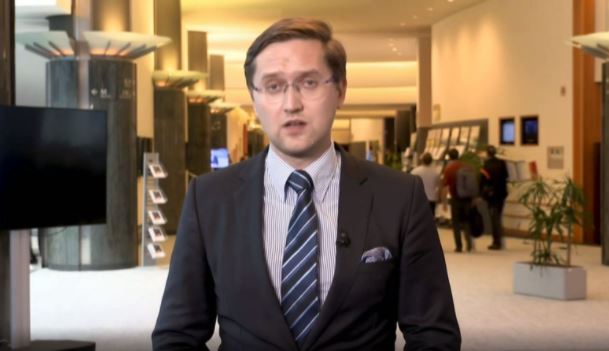
Thank you very much for inviting me to this meeting on Iran. It’s a very important issue. We hear executions continue in Iran.
We cannot accept this. We also seen how the regime has launched a brutal crackdown against popular protest demanding change and freedom, which take place frequently in Iran since 2018.
We hear their demand to get rid of this corrupt regime, but what is the EU really doing to help them? We cannot continue business as usual with such as state to such a regime where we know they are killing anyone who expresses discontent or opposition. This is not the EU. The EU should say you either end this barbaric treatment or we don’t have anything to do with you.
We have today evidence that Iran state terrorist has reached European soil. One Iranian diplomat, Assadollah Assadi, is to be prosecuted next month in Belgium for his involvement in the bombing of the gathering of Iran’s pro-democracy opposition in Paris on June 2018. We also know about other activities in other European countries. Assadi was put in the EU terror list just recently, but that is not enough. We need to ensure that the regime does not continue such harmful activities on European soil.
This is the direct result of the policy of appeasement and sanction relief pursued by the EU, which culminated in the 2015 Iran nuclear deal that essentially left Europe paralyzed in the face of Iran’s growing destabilizing activities, terrorism and domestic repression.
So the time has come for the EU and its member states to revise and alter this appeasement policy in favor of a firm policy toward Iran, because like any other dictator in the history, Iran’s regime only understands the language of firmness. This firm policy should hold the regime to account for its terrorism in Europe and domestic repression through sanctions and downgrading diplomatic relations.
The EU must even consider closing Iran’s embassies, because the regime is using its diplomatic missions to carry out espionage and terrorist plots against Iranian dissidents and activists in a state-sanctioned effort to silence all opposition no matter where they are as popular protests against the regime grow across Iran.
Petras Auštrevičius, MEP from Lithuania, chairman of the Delegation for relations with Afghanistan, and member of the Committee on Foreign Affairs
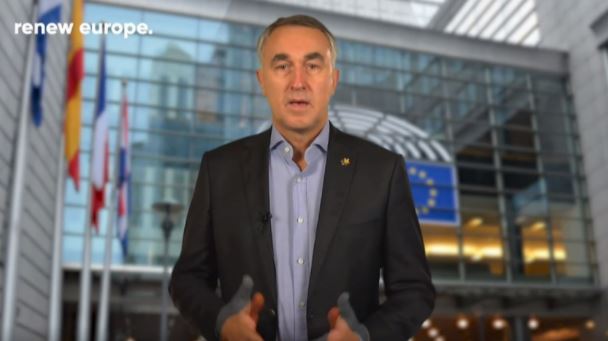
Over the last four decades, the present regime in Iran has committed many crimes against humanity. Breaching human rights, disrespecting citizens rights and opposing opponents. That’s the way the mullahs’ regime is trying to sustain the situation in Iran. International crimes should be added.
The recent execution of Navid Afkari, a champion, was one more case when mullahs, were trying to scare people to show what might be awaiting others if they raise their voice, and they stand for human rights.
The United Nations should send a monitoring mission to Iran as soon as possible. We have to monitor a situation. We have to report, and we have to defend human rights in Iran standing with Iranian people.
Radka Maxová, MEP from Czech Republic
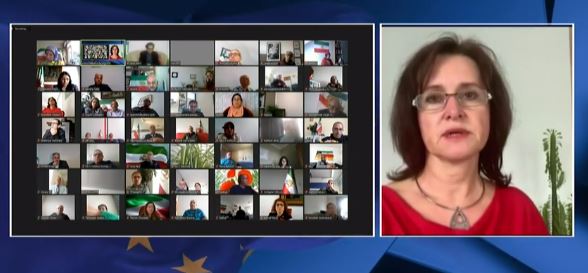
The human rights situation in Iran is very worrying and what is worse is that the violence is ongoing. Women are the first targets of this regime despite the persistence attack on their fundamental rights. Iran women keep courageously fighting the regime.
We saw it in the protests last year, where 1,500 protesters were killed last November, including 400 women. Many protesters were arrested and are right now in terrible conditions in prison.
We have debated on many occasions in the European Parliament the need to end violence and suppression in Iran.
Now, with the news coming from Iran, of all the execution and the death sentences, serious action is needed. The Iranian regime cannot continue to violate the human rights of its own Iranian people. The EU should strongly oppose the autocratic government that violates fundamental rights of its citizens and should use its political and economic powers to help the opposition.
I would like to thank all of you, especially Ms. Rajavi, for your tireless efforts for a democratic and free Iran. We stand with you and the Iranian people in your aspiration for democracy, and we hope that four decades of suffering will end very soon. Thank you.
Anna Bonfrisco, MEP from Italy and member of the Committee on Foreign Affairs
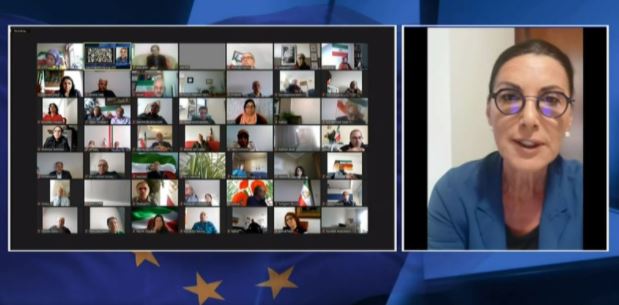
Thank you for inviting me, dear friends, of Iranian resistance. I wanted to speak in this meeting even through a video because today’s the World Day Against Death Penalty.
The violation of human rights of the freedom cannot be considered as an internal affair of a country but must concern all of us. Citizens, governments, Parliament’s, and Coronavirus have shown how interconnected we are and how the internal affairs of a country are also the affairs of all of us. How many infections, how many deaths, how many tests have been done in Iran? We will never know that for sure. If we had known what was happening in China at the beginning of the year, we would have acted much better.
As a parliamentarian, I am concerned. But I am fighting against the opportunistic silence of many European governments, including the Italian one which seem to put the interests of the political and economic interests before the interests of oppressed people. I am troubled when I see a great people such as the Iranian people powerless before all the actions against those who oppose the regime. They must be helped from outside. We must help those who raise their voice.
Media pressure, opinion pressure, and political pressure could be ongoing. We should not intervene just to censor executions, which are shameless, such as Navid Afkari‘s execution, the wrestler who was executed because he had taken part in protests. Or such as a woman lawyer. We all remember Nasrin Sotoudeh. She was sentenced to 38 years in prison and 150 whips without having had even a defense lawyer. Now she is in hospital because of a hunger strike, a non-violent fight to react to the recent arrest of her daughter who is only 20 years of age.
Dear Iranian friends in Europe who are witnessing these injustices against your people, I want to tell you that you’re not alone. Your country is in an enviable position and it can have a determining role, which is young people who are the majority of your 80 million inhabitants. We must help you also through internet and social media. We must help young Iranians to take back their future which is made of freedom and respect of human rights.
Anna Fotyga, MEP from Poland, Secretary General of the ECR group and member of the Committee on Foreign Affairs and former minister
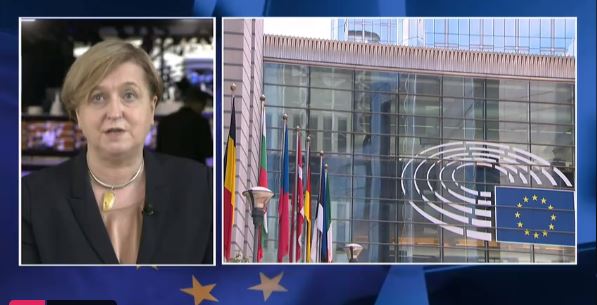
Dear Iranians, friends, greetings from the European Parliament. I’m very sorry not being able to participate in person in your important conference. I just wanted to say and send this message to show my main concern for the situation of ordinary people of Iran.
Almost exactly one year ago in the course of mass protests of Iranian people, we were able, in the Parliament, to debate the violent actions taken by the regime of Mullah against its own people. European Parliament by majority of MEPs condemned actions taken against people effecting in many deaths and imprisonment of thousands of people.
The whole situation was exacerbated by eruption of the COVID-19 pandemic, in particular in Iran with the poor state of health care, but also by really dreadful situation, conditions of political prisoners in prisons. It was a real disaster and people sorted deeply.
We stay by ordinary people, we want to support them on our daily activities in the European Parliament, we try to stay in touch by people of Iran and show our solidarity. It is extremely important for the civil society of the country to find their way to show strength to enable people taking care of their own country. It is in the interest of the whole international society.
And therefore, we support requests for changes in Iran for respect human rights, to respect the Universal Declaration of Human Rights, to give people their citizens’ rights and possibility to live peacefully, to abandon death penalty, in particular death penalty against minors, because in many cases, it is a common situation in Iran, and people face this disastrous development of events.
We would also like Iran to see the prosperous economic development, enabling many ordinary, small-scaled traders to benefit from riches of the country from raw materials and producing capabilities Iran has. Unfortunately, after the introduction of JCPOA and the freezing of founds, the financing possibilities were limited to two upper echelons of society preventing ordinary people from benefiting of this development.
I think that we have to stay firm, that we have to expose the atrocities of Mullah regime in particular the attitudes of political prisoners and the attitude towards women, minors, and also citizens of dual citizenship because persecution was common experience also of many Europeans of Iranian origin. Thank you.
Tunne Kelam, former MEP
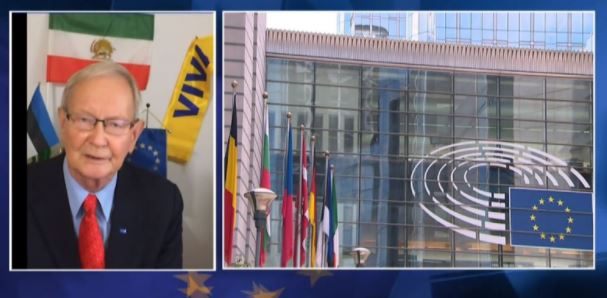
Dear friends, colleagues, Dear Mrs. Rajavi, It’s a pleasure to be with you today.
Indeed, we have come a long way together with PMOI. As a MEP I joined the Friends of Free Iran group 16 years ago and served as one of its vice presidents. We had the opportunity to observe and support your fight to clear the PMOI name in the European Court, pave your way to the European Parliament and participate in your various activities. My most memorable impression was visiting the First Ashraf camp in 2008 together with Alejo Vidal Quadras and 2 other colleagues. My last visit to the newborn Ashraf III in Albania was in November 2018 where we met with Madame Rajavi. The creativity, morals, sincerity and determination of the Ashraf residents have convinced me that you will overcome.
Today, this change is nearer than any time before. It is crucial to realize that democratic countries are part of the solution. In fact, they bear direct responsibility for the continuation of Tehran’s inhuman and aggressive dictatorship. Western ambiguity, pragmatic economic interests and double-standards are helping to prolong the mullahs’ bloody rule. We need to realize that every additional day of this regime means new arrests, new executions and new suppression.
It is high time to conclude that the 2015 nuclear deal has failed the expectations that were cherished in the West. It has shown that the Tehran regime has absolutely no intention of meeting its commitments, or to become more humane. On the contrary, Mullahs have used the deal to gather strength and intensify their aggression across the Middle East. Today, it has become clear that only regime-change can make Iran a normal, friendly and nuclear-free country. Madame Rajavi’s 10- point program is the only realistic way to achieve this goal. There is no other scenario to solve Iran’s problem – internally as well as externally.
The change in Iran is the sovereign right of the Iranians. But it can be advanced by a change of EU policy. As a former MEP, I am disappointed with EU policy which has kept appeasing the mullahs despite so many horrific crimes. The EU has mostly looked aside or just paid lip-service in reacting to these crimes. We must react not by whispering our concern but by concrete actions. We must impose sanctions on this regime for their human rights breaches or risk losing EU’s own credibility. We must recall our ambassadors from Tehran to protest the regime’s inhuman behavior. The EU has to demand unhindered access to Iran’s prisons, especially to the prisoners held since the November 2019 protests.
Iranian nation is fed up with the ruling theocracy. This is proven by people’s wide-spread and continuing uprisings, by their slogans. Earlier this year, the people chanted “down with dictator, be it Shah or Supreme Leader.” The people of Iran want a free and peaceful country. They deserve their rights and dignity to be restored.
Therefore, it is the duty of every citizen of the free world, especially the politicians, to support the Iranian people’s aspirations for democracy and freedom.
Let us keep working together to that end and be sure that I will continue to stand with you until the day that Iran will be free. Thank you
Struan Stevenson, former MEP, president of the Parliament’s Delegation for Relations with Iraq (2009-14) and chairman of the EP Friends of a Free Iran Intergroup (2004-14)
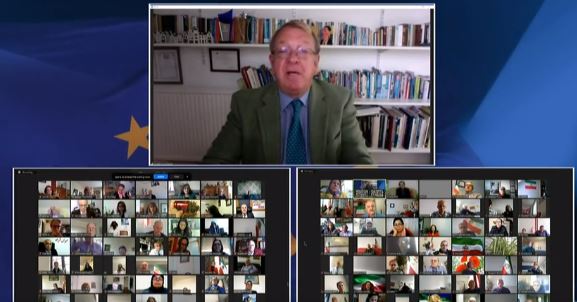
Sixty million Iranians are now living below the international poverty line. The grinding privation and penury has driven people to sell their livers, kidneys and even their corneas for cash. Sick organ traders are exploiting the poor to rake in huge profits. The Iranian currency – the rial – is in freefall. It has lost 49% of its value so far this year, as the US ramps up economic pressure with renewed sanctions. Iran, as one of the world’s leading oil and gas producers, now has one of the world’s most worthless currencies, with hyper-inflation topping 34.4% annually. Forty-one years of venal corruption, dim-witted incompetence and brutal oppression by the fascist Iranian government has brought this once prosperous and successful nation to its knees. Revolution is in the air.
When the theocratic regime announced a massive threefold hike in gasoline prices in November 2019, millions of poor Iranians took to the streets in protest. The mullahs’ predictable reaction was to order their Gestapo, the Islamic Revolutionary Guards corps (IRGC) and their internal security thugs – the Basij – to brutally suppress the nationwide uprising. Black-clad and masked IRGC snipers gunned down unarmed protesters from the rooftops of government buildings, shooting to kill. Basij goons beat young demonstrators with batons. 1,500 protesters were killed, thousands more were wounded.
The IRGC dragged injured protesters from their hospital beds. They were taken to specially prepared torture centers where many perished. Over 12,000 were arrested and thrown into the regime’s medieval prisons. Dozens have been sentenced to death for daring to challenge the authority of the fascist dictatorship. The execution of political prisoners has become almost a daily event, as the ‘so-called’ moderate President Hassan Rouhani, in his absurd speech to the UN General Assembly, proclaimed that “Political freedom at home is very important to us, and as the most ancient democracy in the Middle East, we are proud of our democracy, and we will not compromise our freedoms with foreign intervention.” His pathological lies have fooled no-one inside Iran.
The seething resentment and antipathy to the clerical regime has begun to boil over. Poverty-stricken Iranians are appalled that their government continues to pour money and military personnel into Syria in support of Bashar al-Assad’s bloody civil war. They are horrified that the mullahs are funneling endless Iranian cash to the Houthi rebels in Yemen, Hezbollah in Lebanon and the vicious Shi’ia militias in Iraq. They are shocked to learn that vast resources are being channelled into the secret production of nuclear weapons and ballistic missiles, despite Rouhani’s international denials. And they are dismayed that corruption and incompetence has seen the death toll from COVID-19 soar to over 116,000 nationwide. Resistance units of the main, democratic opposition movement, the People’s Mojahedin Organization of Iran (PMOI/MEK) have been formed in every town and city in the country. Sporadic outbursts of anger and protests against the regime have occurred daily, with defiant youths torching and vandalizing regime-affiliated sites.
The execution of the young wrestling champion Navid Afkari, despite a global campaign to stop his judicial murder, has sparked renewed fury across the nation. His hanging outraged young Iranians who regarded Afkari as a sporting hero. Young resistance fighters have attacked courthouses, government buildings and IRGC and Basij bases in towns and cities throughout Iran. A centre for promoting fundamentalist Islam was torched in the city of Karaj. Banners, posters and images of Iran’s Supreme Leader, Ayatollah Ali Khamenei and of the terrorist IRGC Quds Force General Qassem Soleimani, killed by a drone strike in January, have been repeatedly targeted and set on fire by protesters. Marchers in street protests routinely chant slogans such as “The Supreme Leader’s end is near,” and “Rise up to avenge Navid’s execution.” Anti-regime slogans and messages from the Iranian Resistance leader Massoud Rajavi, and President-elect of the National Council of Resistance of Iran (NCRI) Maryam Rajavi regularly appear on walls and hoardings.
As resistance to the mullahs continues to grow across Iran, there are increasing demands for the international community to end their policy of appeasement and show their support for the Iranian people. The ongoing torture and execution of political prisoners is a crime against humanity and continues because the United Nations has singularly failed to hold the mullahs’ regime to account for the massacre of over 30,000 political prisoners, mostly supporters of the PMOI/MEK, in 1988.
Although there is irrefutable evidence of this horrendous crime, which even senior figures in the regime openly admit and boast about, no-one has yet been indicted for this horror, one of the worst cases of genocide of the late twentieth century.
The revolution is coming and when it does, the mullahs will face justice and those in the international community who have sought to appease them will be held answerable and shamed in the court of public opinion.
Paulo Casaca, former MEP

Dear Madam President Rajavi, delighted to listen to your assessment of the situation on Iran. As we are about to end our conference, I would like to elaborate a bit on one point that I think is fundamental, one that was raised actually by at least three honorable members of the European Parliament, Benoît Biteau, Javier Zarzalejos, and Petras Austrevicius, which is the nature of the crime committed by the Iranian regime that was in evidence with the so-called execution of Navid Afkari.
It is absolutely clear that the European Parliament and in this regard, the NCRI as well which is one of the 10 points, we are fully against the death penalty in any circumstance. But as it was said before, what we have seen here with Mr. Afkari was not the death penalty, was a state crime, was an execution that did not even follow the procedures set by the Iranian regime.
Actually, this is not the first time. This is not the second. This has been a system that was clearly symbolized by the fatwa of 1988, that ordered the religious Supreme Leader of the time, the late Ayatollah Khomeini, he ordered the murder of all the political prisoners, the vast majority members of the People’s Mojahedin in Iran or other organizations that were political opponents. He ordered their murder. This is according to the Swiss law, clear a genocide.
I am absolutely delighted to see that, although so many years afterwards, the Swiss authorities understood that the murder of Kazem Rajavi is included in this genocide. It was not in 1988, it was two years after, but it comes out of the same fatwa, it came out of the same regime.
The question is, dear members of the European Parliament, that warriors, the genocidal leaders of Rwanda that made this horrendous massacre are not in power, some of them brought to trial, the same happened in Cambodia, or even those responsible for the genocide in 1970 in Bangladesh, this has not been the case in Iran.
No one that is truly friend of human rights can rest in peace, can be in peace with himself up to the moment that this genocide is brought to justice. This is a must, that we, when we were in the European Parliament, tried our best to accomplish. But, seeing so many European parliamentarians, I am so glad to see that the trouble is going on, and it can never stop. This criminal regime, the responsible people have to be brought to trial for genocide. Thank you.
Kimmo Sasi, Former MP and Minister, from Finland
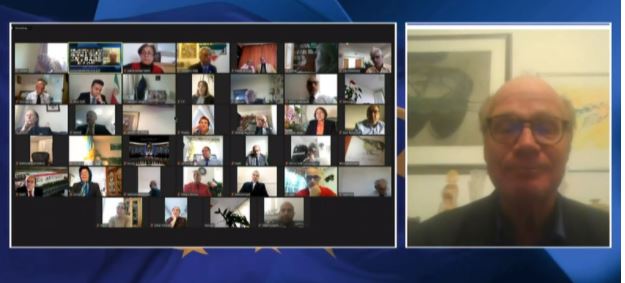
Thank you so very much indeed, Madame Rajavi, dear friends of human rights.
Iran is a great country. She has very proud history and excellent culture. In fact, the country should be very rich because she has a lot of oil, but that’s not the truth of today. Today, Iranian people are the hostess of the worst dictatorship in the world. Because of the corruption, many people live in hunger, and the country is isolated because it exports terrorism. The history shows there’s a clear path to prosperity. Europe learned after World War II that we have to trust in certain values, which are democracy, human rights, rule of law, market economy, and also the equality between men and women. If you go on this path, you will be successful.
Iranian people protest today because of the terrible conditions in the country. That is why the dictatorship in Iran is very afraid. They know what happened in Eastern Europe late 1980s, when people took the power in their own hands. The Iranian dictatorship is desperate at the moment and that is why they try to crush their own people. It’s a very bad thing that this means that protesters have been killed, murdered, and many of them sit in the prison at the moment.
Navid has been mentioned today several times. He was hanged a few days ago. The fact is that Iranian authorities tortured Navid for weeks. In a smuggled letter, he described how for 50 days he was beaten with sticks and batons on his arms, buttocks, and back, and had a plastic back over his head until he was almost suffocated. And finally, he was executed. He was murdered. This single case is a hero of people.
What must be done? We need economic sanctions. But then, when you put economic sanctions, of course, you have to try to take care that there’s no black trade that’s used by the dictatorship and the corruption. Then we need also personal sanctions. There must be sanctions against those people who are leaving the country and who have been involved in the murdering of the people. It means their money abroad must be frozen and if they ever come outside the borders of Iran, they must be seized, they must be brought into the court of law, and they must be sentenced for their crimes.
Unfortunately, many Iranian diplomats as well have been engaged with terrorism. It means the European Union member countries must look how many diplomats Iran can have in their own countries. There must be thorough surveillance. I think Iran must not have that many diplomats in our countries because of the terrorism.
One thing that the European diplomats must do in Iran is they must go to the prisons, look after the demonstrators, try to protect them, help them, and make their cases very well-known to try to save their lives. What’s very important as well is that there is an investigation to all mass murders. Very important is the murdering of many people in 1988. Those who are guilty must be brought in front of the court.
Finally, there is only one way that can really solve the situation and that is that the Iranian people take their own faith in their own hands. We need a change of the government, change of the regime in Iran. That is the only durable solution. Thank you. The fight continues.
Dr. Alejo Vidal Quadras, former vice-president of the European Parliament from 1999 to 2014

It has been indeed an honor for me to speak today, at a time when the Iranian people are so bravely and so dangerously seeking justice and fundamental changes in their country.
This conference, once again, reminds me of conferences in the past, those happy times where COVID was not with us, and we could host and welcome Mrs. Rajavi in the parliament, and listen to her personally, to her very inspiring speeches. But in spite of a pandemic, here we are all together today.
I would like to thank all the MEPs that have participated in this conference, how they expressed their concerns, and their interest in the pains and plight of the Iranian people. I am grateful to all of them and also to former members like myself.
I am also glad that all colleagues have brought attention to our focal point, which is human rights abuse in Iran, the dangerous situations of the political prisoners under torture, and how they face not only torture, but execution.
They were very right to highlight these very harsh reports by Amnesty International about the tortures and about the epidemic. If all these things are true, and of course, indeed they are, we all have a very serious concern about the inaction of the European Union and the High Representative.
Let’s look at two recent cases. I refer to two political prisoners, Navid Afkari and Mostafa Salehi, both arrested during the regime protest. Amnesty International urged actions on them calling for a campaign to stop these barbaric executions. What did the European Union do in this regard? Nothing, absolutely nothing.
They waited to get Borrell, external action service, the national governments, they waited until they were executed. And then, they posted a tweet of condemnation. Navid and Mostafa could have been alive today if the European Union, the leaders, and the member states acted promptly and took concrete and strong action to stop these murders. They could have done many things to put pressure on the regime, but they didn’t. And Navid and Mostafa are dead.
Many members today spoke about their appalling situation of human rights in Iran. I know for sure that there are many more members in the European Parliament, which are very concerned about it. They could not join us today, but I know they think exactly as we do. It was a similar situation when I was Vice President of the European Parliament, many of us asked the high representatives of those days, Lady Ashton and Mogherini.
They asked them not to ignore the brutalities of the regime and act firmly. Unfortunately, they did not listen to us and their reaction was the same as it is today, doing absolutely nothing.
Today, the European Union and United Nations are following, they do very right with their situation in Belarus. They protest and they call for punitive action. This is very good, and we wish them success. But the question is, why in Belarus they act, and the atrocities of the Iranian regime do not deserve the same attention, why? Because in Belarus, the protesters are suffocated or beaten? Yes, but they are not executed, not taken to torture, genders being tortured to death.
They are not harmed. Why Belarus deserves the attention of Mr. Borrell and Iran does not? Can somebody could explain to us this mystery? The United Nations sent a fact-finding mission to Venezuela. Very good. Congratulations. Why did they not send a fact-finding mission to Iran when things are so bad or even worse, much worse than in Venezuela? How can the European Union and the United Nations remain silent in face of all these savage killings in Iran just to save the nuclear deal? The nuclear deal must be paid with a price, which is the life of so many innocent Iranians. Nuclear really deserves a bloodshed in Iran.
Nothing serious is done to stop the brutal killing of all these innocent demonstrators. They are entitled to protest according to the United Nations Charter and according to the Universal Declaration of Human Rights. Where are our European principles? Where? Why they are silent when all these terrible things are happening in Iran? How can the European Union leaders look to the eyes of the Iranian people who are suffering under the most brutal tyranny of many years and just do nothing? How can they look to the eyes, to the two little children, the two little kids of Mostafa Salehi? Can they look up to the eyes, to these two children and tell them they did nothing while his father was being murdered by this regime?
This must end and this must end now. Enough is enough. The role of the European Parliament to stop this criminal theocracy of the mullahs is crucial. There are many members that reject this pusillanimous policy of the European Union and want to change it to a more committed and firmer stance.
The European Parliament must keep and redoubled the pressure of the Council on the High Representative on the European external action service until they take real action to protect the Iranian people from the brutal oppression of the Supreme Leader, Ali Khamenei and his staffs. The International Committee, in search of justice, will always be on your side for this pressing and morally necessary task. Thank you very much.
Isabella Tovaglieri, MEP from Italy, and member of the Committee on Women’s Rights and Gender Equality
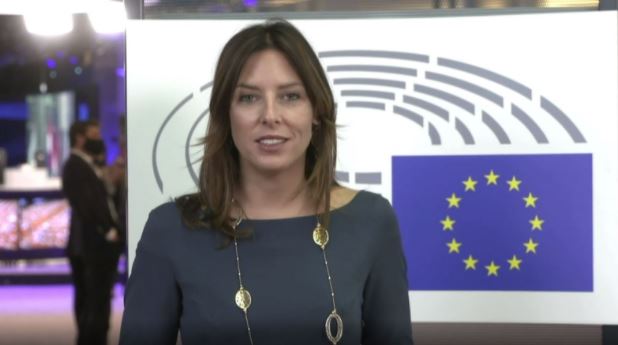
The EU and UN must take action on Iran. The people of Iran want change. The economic situation is desperate. The covid situation has rendered the situation worse because of the regime’s mismanagement and hiding from the people.
Iran has rejected help from the international community on the coronavirus situation. Iran is repressing demonstrations. I’m disappointed that a woman is invoking a soft line toward the regime. The regime is especially violent toward women.
Repression against women has worsened since they decided to stand up against the abuse of security forces. A fact-finding mission is needed to visit prisoners in Iran’s prisons. The regime’s law considers women inferior to men.
We cherish the values of freedom, and we cannot accept the breach of rights by a hypocrite regime. We must support Iranian women and safeguard our values.
Jean-Pierre Muller, former mayor of Magny-en-Vexin and member of Departmental Council of Val d’Oise
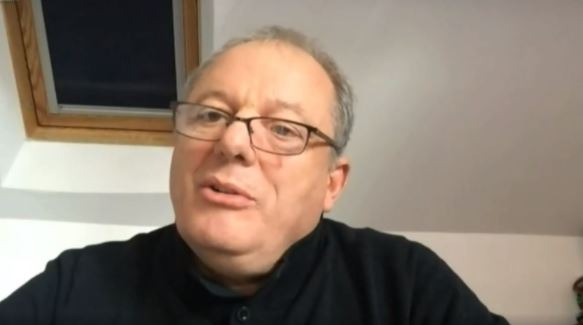
Today, the mullahs’ regime is a dictatorship and a criminal regime. It is a toxic regime that is dangerous for the region and the world. It threatens the world with terrorism. Things cannot continue and have to change. The world is not acting enough as the situation deteriorates in Iran. We must act strongly and positively.
The PMOI is the number one alternative in Iran. We have to restore human rights, continue the embargo to stop the mullahs. We have to expel all those so-called diplomats.
We must carry out a fact-finding mission to know more about the massacres of this regime. This regime is one of the most dangerous in the world because of its violation of the most fundamental human rights.
We must also understand that the mullahs’ Iran is not the real Iran. This regime is really dictatorial and is staining our world.
Alejo Vidal-Quadras’ final remarks
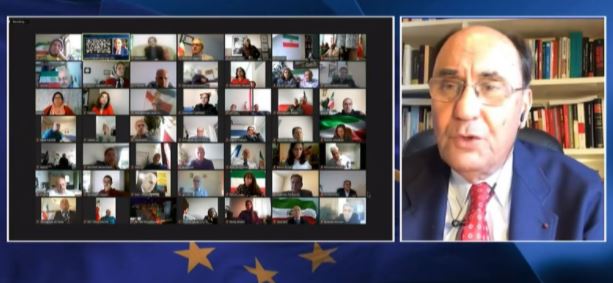
Alejo Vidal-Quadras concluded the conference by saying:
National parliaments and the European Parliament must be the spearhead of the effort to support democracy in Iran because the EU and the High Representative do very little.
The situation in Iran has come to a level of oppression, of brutality and criminal suppression by the regime that it is untenable. It must end.
We have been fighting for years, together with you, Mrs. Rajavi and the Iranian Resistance, to change this terrible situation. It is time that national governments and the European External Action service take action. If they do nothing, every innocent life lost in Iran at the hands of the regime will be a responsibility of those who do nothing.
The evil men win when the good men do nothing.

